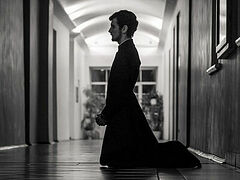Many times in the past, and even now, people have asked me how they can learn to pray, how to rid themselves of absent-mindedness during prayer. They say that when they’re praying, everything distracts them and scatters their thoughts, even a ray of light falling on an icon. The pomp of the hierarchical Liturgy also distracts them from prayer. They say, “We can’t concentrate, we can’t pray properly.” And they ask me to teach them.
Is it simple? Oh no, it’s not easy at all. For, what are they asking me to teach them? The greatest, the most difficult of all human deeds. For what is prayer, true prayer? Direct communication of the human spirit with God.
If this is how you understand prayer, I’ll give you the most important answer to the question of how to rid yourself of absent-mindedness. I’ll tell you that if prayer is communication with God, then we must be worthy of this communication, we must be capable of it. But if a person’s constantly wrapped up in the vanity of the world, if he rarely, if ever, remembers God, if he’s mired in passions, lusts and sins, how can such a person’s entry into communication with God be easy or simple?
Communication with God requires great podvig. It requires that all your thoughts and aspirations should be directed upward, toward what is holy, toward God. Those who learn to pray deeply and sincerely are those who constantly direct their thoughts and aspirations to God, who try with all their might to rid themselves of earthly vanity, from everyday worries; they devote a lot of time to reading the Holy Scriptures, the works of the Holy Fathers, they pray often and fervently, and most importantly, they diligently fulfill the commandments of Christ. For the Lord calls His friend only the one who keeps His commandments and becomes close to Christ. This is the main answer: We must strive for holiness, we must strive as far as it is in our power, to turn all our thoughts, our spirit toward God.
Deep philosophers, deep scientists, whose thoughts are always focused on the most important questions of existence, on difficult scientific questions, are always focused. Their thoughts are chained to these questions, and aren’t scattered, their thoughts don’t wander here and there. They keep their thoughts on that one important topic they’ve dedicated their life to. They are always focused, and we ought to imitate them. Just as they focus all their thoughts and aspirations on very high questions of philosophy and science, so we must live in God, our thoughts must always be turned upward if we want to be in communication with God. This was what those who were strong in spirit and full of love for God did—they went out into the wild forests and deserts because they wanted to (and did) learn to pray, because they replaced earthly thoughts with thoughts about God, and focused their lives on achieving spiritual perfection.
And people who are traveling an entirely different path, living in the constant bustle of the world, complain, “No matter how hard I try, prayer doesn’t come. No matter how hard I try, I’m constantly distracted.” Mentally they conclude that if nothing works out, that means it isn’t worth trying—I guess it’s just my nature that I can’t be free from absent-mindedness and wandering thoughts.
Many people refer to the imperfection of our nature. This is the same as a person who doesn’t know how to swim throwing himself into the water and, being unable to float, saying to himself, “My body is heavier than water, I can’t float. What can I do if the nature of my body is such that it’s impossible to swim? It isn’t even woth trying.” Isn’t that ridiculous? Aren’t there lots of people who can swim and float just fine? The thing is that they don’t want to learn to swim, so there’s no reason to blame nature when they’re distracted during prayer. It’s not nature that’s to blame, but their unwillingness to focus their spirit on prayer.
The holy Prophet David said: Blessed is the man whose help is of thee, O Lord; in his heart he has purposed to go up (Ps. 83:6). Blessed is the man who has help in God. Why does he have help? Because he has purposed to go up in his heart: because he made it the intention of his heart to ascend higher and higher to God. This is a blessing for such a person—he will receive help from God, he will also receive the power of prayer. Woe to the man who doesn’t ascend with his heart, who isn’t afraid of the fact that his heart is sinking lower and lower, is filled more and more with base, bad passions. Such a person won’t have help from God, and such a person won’t be able to pray.
The holy Prophet Jeremiah says: How long will thy grievous thoughts be within thee? (Jer. 4:14). This is the most important thing that’s needed: We need to expel all our evil thoughts from our heart. How many wicked thoughts we have, and how slow we are to expel these thoughts from our hearts! And if our heart is full of wicked thoughts, how will we be able to pray?
You see: Distraction in prayer stems from the fact that the heart isn’t always ascending, from morning to evening, toward God, that people haven’t made it the goal of their life to ascend to God and don’t notice that they’re not ascending toward God, but are descending lower and lower.
That’s why they have no prayer.
There’s a great prayer, considered the most important and basic prayer for monks, which they do with prostrations or bows: “Lord, Jesus Christ, Son of God, have mercy on me, a sinner.” This prayer has great power, and whoever gets used to it, who constantly repeats it, invariably receives grace from God and learns to pray. But when I advise people to start with this prayer, they try and then soon give up and say, “We repeat the prayer mechanically, but we don’t see any benefit.” They want it right away, they want to get benefits quickly, they don’t understand that it’s only through long spiritual and physical work that you can acquire a great ability to pray, and that this isn’t granted to anyone right away.
Some even complain that the hierarchical services distract them: Why’s the bishop always changing his vestments? What’s with this dressing up? They don’t understand what they’re talking about. Of course, there’s no dressing up—you see that the omophorion is removed from the bishop several times, and then put on again. What does this mean and why is it being done?
If you know this, you won’t talk about dressing up, you won’t be bothered, the removing and returning of the omophorion won’t interfere. The omophorion is the most important of the bishop’s vestments. All sacred garments have a special meaning, and the omophorion represents the lost sheep that the Lord Jesus found in the wilderness and took upon His shoulders. The omophorion denotes this duty of the bishop, the shepherd of Christ, to find and carry lost sheep on his shoulders. The bishop represents the Lord Jesus Himself, but during the Liturgy there are moments when it is as if Christ Himself appears before us.
So, when reading the Gospel, you seem to hear the Lord Jesus Himself. It is as if He appears before us, so the bishop must remove the highest sign of his sacred dignity—the omophorion—and in doing so, he shows his humility before Christ.
Also, during the Great Entrance, the diskos with the blessed bread and the chalice with wine signify the Lord going to suffer, and the bishop, meeting Christ at the Royal Doors, accepting the cup and the diskos from the priest and deacon, must again remove the omophorion.
And then, when the most important moment of the Sacrament of the Eucharist comes, when the bishop utters the great words of Christ: Take, eat, this is My Body which is broken for you for the remission of sins, and, Drink of it, all of you; this is My Blood of the New Testament, which is shed for you and for many, for the remission of sins (Matthew 26:26-28), when a bishop blesses the bread and wine, invoking the Holy Spirit, by Whose power the bread and wine are transformed into the true Body and Blood of Christ, then he must be in the fullness of his sacred vestments when performing the great Sacrament. Once the Sacrament is performed, it’s necessary to remove the omophorion, because Christ Himself is here; so the bishop must remove it.
This isn’t dressing up, but sacred actions with deep symbolic meaning. Therefore, don’t be bothered by the grandeur and splendor of the hierarchical service—it doesn’t prevent you from praying. On the contrary, for those who understand the great meaning of the Liturgy, it leads to deep prayer.
Only the constant wandering of your thoughts hinders you, because you’re in the constant bustle of the world. You rarely focus your spirit on that which is most important, the greatest and the most holy. Understand how difficult it is to learn to pray; understand that prayer, free from absent-mindedness, free from wandering thoughts, is achieved only by saints. Allow yourself to be imbued with the humble awareness that your prayer is weak because you’re far from holiness.
Pray as best as you can, sincerely, like small children. Christ hears your prayer, for no matter how weak it is, it rises very high to God, and the Lord accepts all prayers. Don’t be discouraged, don’t be idle, don’t expect your prayer to be freed from distraction quickly and easily.
From Make Haste to Follow Christ
1948




